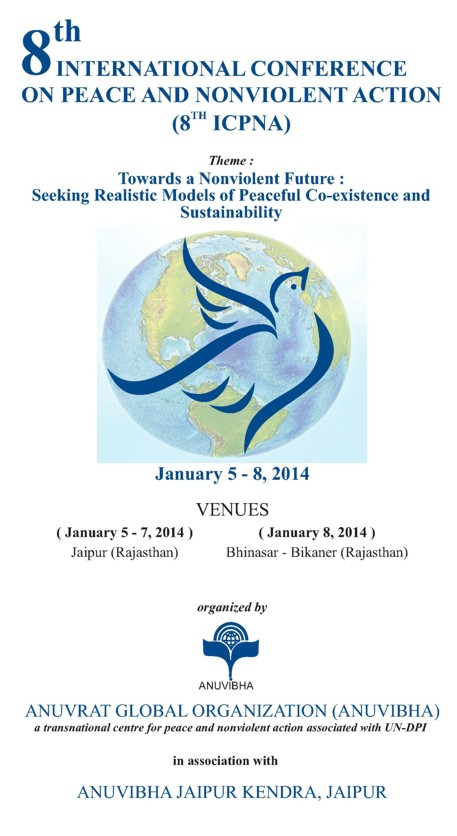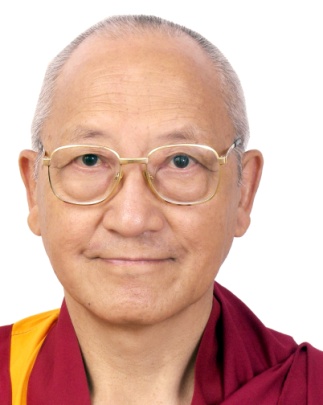 | 8th International Conference on Peace and Nonviolent Action |
Moral Culture of Youth Conducive for a World without Violence
In the 21st century, the new generation is changing the social fabric fast. The youth is energetic, more frank and probably more honest; but they are less patient. In this era of technology and social media, there is tendency to take patience as slowness and even laziness. People want things to happen instantly, here and now and result must be visible.
The Sanskrit word “virya” is to do with qualities like vigor, enthusiasm, strength and force; but for me “virya” essentially means diligence. These days there is a spiritual or religious fervor which is a phenomenon witnessed everywhere. When a guru gives a satsang or when a mullah gives a sermon, thousands over thousands of “seekers” gather voluntarily. But the question is, what are they seeking? Seeking benefit to many people (bahujana hitaya), or seeking benefit to a few in his or her own circle?
Unfortunately, most of the “seekers” are after wealth, name, fame and success in life; and removal of hindrances to some achievements. From strictly Dharma point of view, seeking these personal worldly gains are wrong motivations. When the motivation is of self-seeking, no matter how ambitious one’s goal, result will be little or no benefit for others.
For the real benefit for “many people” (bahujan), I believe that sharing “maitrita” (friendship) is essential.
His Holiness the Dalai Lama said in a statement in the year that just past [2013], “I always have one dream that within this century the world truly becomes a real happy human family. In order to achieve that, we need to have a sense of oneness of the human family. I think through education and more realistic and holistic thinking, I have confidence that we can develop a sense of oneness of humanity. Then, the very basis of violence and war will no longer be there and this century will become a century of peace and non-violence.” This statement was made in connection with 50th year of the famous “I Have a Dream” speech delivered in 1963 by Martin Luther King, Jr. to over 250,000 civil rights supporters in which he called for an end to racism in the United States.
To have a dream means to have a vision; to have a hope; to have an inspiring idea.
We are all very deeply saddened by the spurt of sex related crimes [in India[1]]. The corruption is already a huge obstacle for the wellbeing of people. Making laws may be very important but law enforcement agencies and the members of public must have the aptitude and basic ethical sense for safe guarding the interest of people. I will see how I can explain this point here:
From self-centeredness comes sensual desire and hatred which in turn lead to aggressiveness and indifference towards others, which gives raise to non-caring and untruthfulness.
On the other hand, feeling of maitrita (friendliness) stems Moral Culture. Subtle points of metaphysical, philosophical and great ideals and ideas are very fine. But, we must admit that these great ideals cannot percolate down to deal with ground realities.
Ethical precepts of Great religions show the unanimity.
The mosaic rules:
1. Do not kill
2. Do not steal
3. Do not commit adultery
4. Do not swear
5. Do not covet
They essentially correspond with five great vows or Mahavratas of Jainism, five good conducts or Pañchashila [vijf virtues] in Buddhism and Yamas [virtues] of Hinduism. The principals of these moral conducts are self-control and humanity. These ethical ideals undoubtedly have the great religions as their sources, but if you don’t link these to the concept of GOD or your future lives, they are perfectly secular in nature.
It is said that morality is possible without religion, but religion is not possible without morality.
The first half of this sentence is what I am interested to elaborate; and try to find a formula in an attempt to show how (and if) morality without invoking a religious precept is possible. Essentially we are talking about secular ethics or humanity, and moral culture or self-restraint.
They can be put into four baskets: 1) non-aggressive culture, 2) Truthfulness, 3) Moderation and 4) sense of fairness to others.
1) Non-aggressive culture
We should try to find out why some people are so aggressive and others less. Most of us are brought up in an aggressive society, in a gun culture; and aggressive culture is imbibed in us.
There are three “doors” of action, because any action takes place through these “doors”. Among them, the mind is the first and the foremost. But, it is not visible until it is expressed either through the verbal or physical “doors”. Normally, verbal expressions such as harsh words or lies precede harmful physical actions.
We should not forget that aggressiveness is not only associated to muscle power. There are other forms of aggression. That is show-off of money power and or men power. Sometimes we feel that certain people can bully you because that person can spend a lot of money or he can use his connections with high placed persons; and even can ask his supporters to attack us is an example. The antidote or remedy of aggressiveness is humility. I personally consider that humility is an innate nature of human and the best quality of human being. If one recognizes this fact and tries to imbibe this beautiful quality, it is not a very difficult task to develop it. If one the other hand, one allows to enter bad thoughts into one’s head, it doesn’t take long before the person who cherished these ideas becomes an aggressive, arrogant and monstrous creature.
2) Culture of Truthfulness.
Truthful means not only abstaining from telling lies, but also keeping one’s word given to someone. A small example is the timing of a meeting, or a promise to call back etc. To learn to say “No” when we mean “No” is a better culture. Generally speaking, Japanese people have good sense of keeping promises. They would think hard before saying “yes”. It is much better then saying “I will try” instantly even when you mean “No”. Trying to shift blame from oneself to others is also an act of untruthfulness. Swearing or making a solemn statement, pretending to be holy person are worst kind of untruthfulness.
3) Moderation
We must accept our limits and must not try to achieve high goals from the beginning itself. We should rather take high morality in terms of a spiritual path as target of final aspiration, and begin with small steps. Can everybody follow the examples of a Jain Muni’s life style? No. But people of high level ethics are an example of the possibility.
If you are facing a danger of getting drowned in a big lake, the first thing you try is to keep your head above the water, so that you are able to breathe. Or if your house is on fire, first thing you do is try to save your life and perhaps few most valuable things. Instead, if you try to fill a bucket with water in the kitchen to douse off the fire, it may be too late to save your life. Altruism and the self-centeredness both are extremes for average people. Similarly, both excessive indulgence and strict asceticism are extremes for average people.
Moderation in dealing with people or moderation in enjoyment need to be clearly defined. If you are moderate in relation with society, if you are too stingy, too strict, too obsessive, it may lead to an unpleasant situation in the surroundings, and you will have to regret it later. On the other hand, if you are too generous and too gracious, or too soft, there are chances of others taking advantage on you. In food habits for example, there are non-vegetarians who consume just about everything and then there are also vegans. These are just examples for easy understanding.
I believe that there should be some means of entertainment for average people. So, it will be good to identify some alternative means of enjoyment so that people do not think of taking to drink or erotic ideas as the only way of enjoyment. Soothing music, sacred dance, learning about nature are suitable. Natural beauty is something everybody can enjoy by even mentally imagining or by painting. I don’t know how many people here have come across the description of Sukhavati, the Western Paradise of the Buddha Amitabha found in the collection of Sutras of Mahayana Buddhism.
4) Fairness to others
Often we hear people asking the questions like whether such and such deeds are Kalyan (meritorious) or Akalyan (non meritorious). The background mental attitude of this question is a self-centered one. The real question in the mind is this: ”Will I suffer as a result of this or that act?” That is attitude of small mindedness. And that presupposes that there is a greater mindedness.
To eradicate self-mindedness is possible only in theory, and examples are very rarely found, perhaps, only in literature. But thinking only of oneself, while ignoring others and the environment should be minimized gradually.
In early Buddhism, we find mention of benefit of many people, which was replaced in Mahayana by all sentient to signify the great mindedness. To ask if this act of mine is fair to others is an indication of thought beyond self-centeredness. If this thought makes one to stop certain acts because they are not fair to others, then that is the starting point of great path.
Finally, I have an assertion: if 10% of the humanity practices only 10% of the great moral ideas of our ancient cultures, this world will be much better place to live in.
I would like to conclude my talk with a prayer from Acharya Shantideva’s ”Engaging in Noble Character”:
By the force of this merit of mine,
May all living beings without an exception
Abstain from all harmful acts; and
Be engaged in righteous deeds, all the times.
 Lama Doboom Tulku
Lama Doboom Tulku